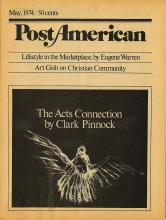Why is it that Christians have not made more use of nonviolent action as a normal part of their life of discipleship? Why is it that the Christians who have initiated nonviolent campaigns have almost always come from oppressed groups, e.g., black Christians in the civil rights struggle marching out from their churches to face dogs and fire hoses, while praying, “Lord, help us to love our enemies”?
Nonviolent action is consistent, in so many ways, with biblical faith that it would seem to be an inevitable part of the church’s evangelical outreach. The Bible calls us to “seek justice, correct oppression” (Isaiah 1:17). The fundamental stance of nonviolent action is work for justice and against oppression, relying upon the power of love and truth. Jesus asks us to take up his cross and to follow him. The whole basis of nonviolence is the struggle for truth, but with a willingness to take suffering upon oneself, rather than inflicting it on others. Nonviolence isn’t just avoiding violence, but working actively for justice and peace in a spirit of love. What could be more in harmony with the prophetic stance of the Bible or with the Spirit of the One who came "to set at liberty those who are oppressed" (Luke 4:18)?
Read the Full Article

